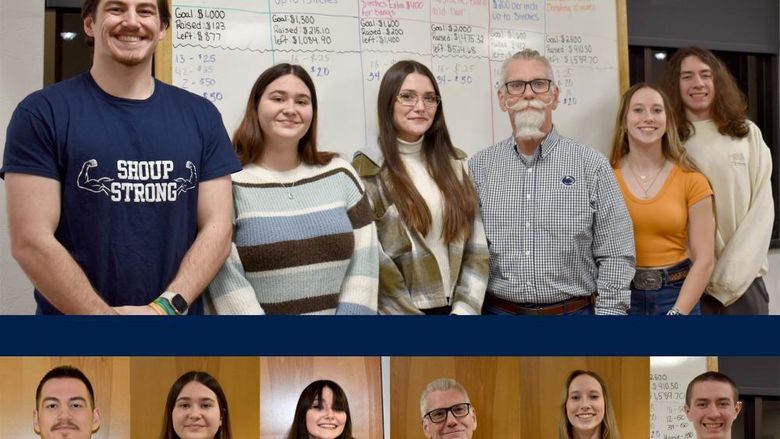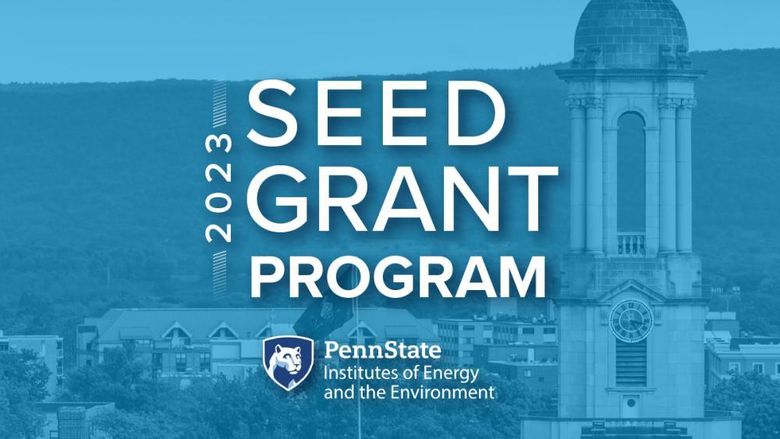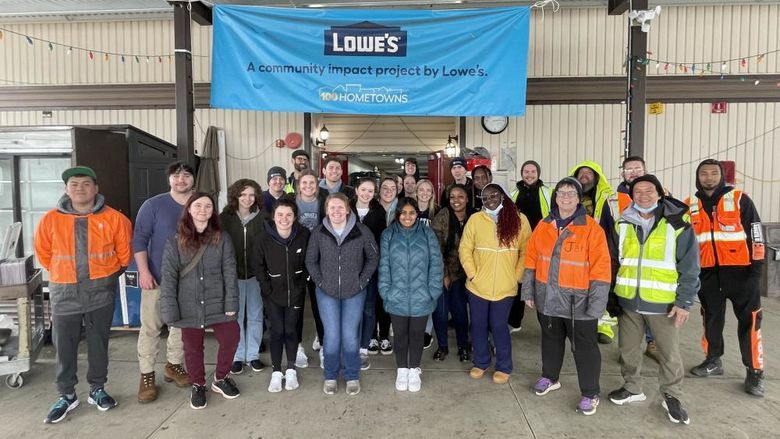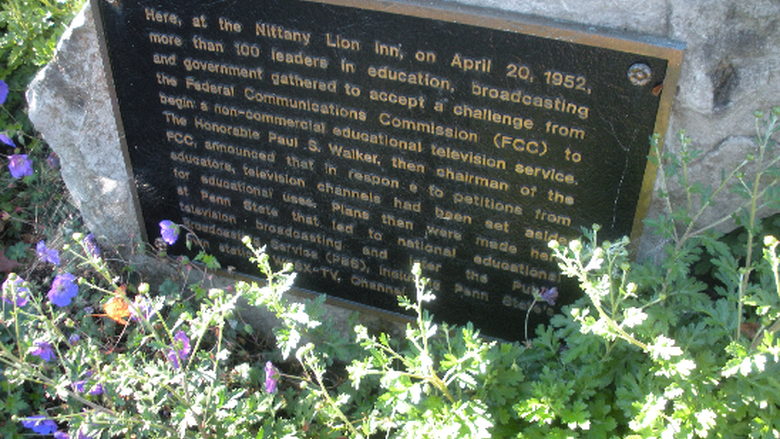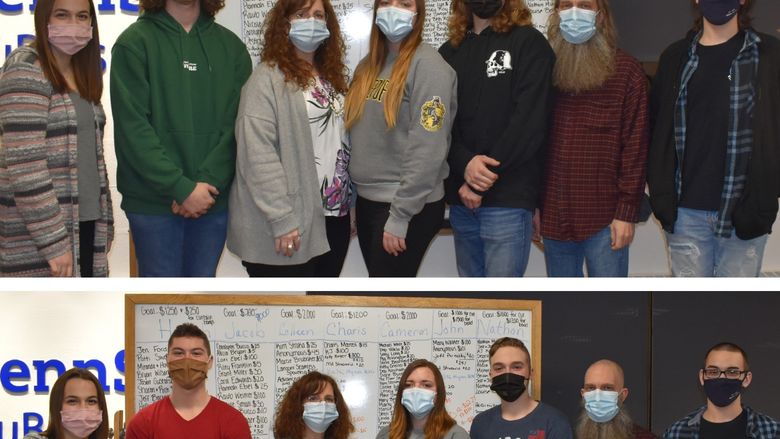The Alternative Spring Break reunion group on the Pine Ridge Lakota Reservation in South Dakota. Left to right, Evan Aravich, Louise Whyte-Aravich, Greg Myers, Marly Doty, Christ Albert, Jessica Metzger and Melissa Chicola.
A lasting legacy at Penn State DuBois of serving others in need was apparent this summer. A group of alumni who participated in past Alternative Spring Break (ASB) service trips reunited and carried out their own, independent service trip to the Lakota community in South Dakota.
In all, seven individuals made the trip. Louise Whyte-Aravich, Evan Aravich, Chris Albert, Jessica Metzger, Melissa Chicola and Greg Myers are all campus alumni who participated in service trips during their time as students. Additionally, Assistant Director of Student Affairs Marly Doty, who has organized the Alternative Spring Break trip through Penn State DuBois for the last decade, participated in this independent trip.
The purpose of this trip was the same as all of those campus trips before it: to help others in need, and to serve communities that need a hand overcoming obstacles like poverty and homelessness. In South Dakota, the volunteers worked with the Pine Ridge Agricultural Initiative on the 2.8-million-acre Pine Ridge Lakota Reservation. It is among the poorest areas in the country, with an average life expectancy of only 48 years old. Diabetes is epidemic. The suicide rate is more than twice the national rate, as is the rate of heart disease. Unemployment is between 80 and 90 percent. The health crises are a result, largely, of limited access to whole foods, leaving unhealthy processed options as the only thing for the people there to put on their tables.
The Penn State DuBois alumni volunteered through global service group Amizade to assist the Pine Ridge Agricultural Initiative in their mission to create a sustainable future for the Lakota by providing access to healthy food, adequate housing and gainful employment. Efforts are just getting underway, as the Penn Staters were only the second group to volunteer at this site through Amizade.
"Over the years, we have built a close relationship with Amizade, a nonprofit organization out of Pittsburgh, focused on sustainable service partnerships. Amizade has a Global Switchboard and works tirelessly to make the world a better place alongside, not in front of, the community being served. This is crucial and something that makes them unique. They don’t take money from people to do things that are needed in the community," Doty explained.
The volunteers helped with preparing and maintaining gardens, gathering firewood, completed renovations on residents' homes, and helped to renovate a cabin where future volunteers will stay during their service. They also took on a project to make a building where many cultural ceremonies are held accessible for people with disabilities, as many individuals have had legs amputated due to complications from diabetes.
Louise Whyte-Aravich, who also worked as a student activity assistant on campus after graduating, said, "Service has always been something I have enjoyed and have been incredibly passionate about, and this trip to the Lakota Reservation in Pine Ridge was above and beyond anything I had experienced before. We originally selected this site because many of us had participated in service on the Navajo Reservation and became more educated on the history of Native Americans and the injustice that currently occurs in our country. We were also very excited as one of the trip participants works and lives at Standing Rock and we wanted to learn more about the Lakota culture and history as a result of knowing him and his journey."
That participant living and working at Standing Rock is Chris Albert, who got inspiration for his entire career path by taking part in an ASB trip as a student. He said, "I currently live and teach high school on Standing Rock Reservation in northern South Dakota so, I fully grasp 'reservation life.' Most of the country doesn't understand the impact that high poverty and unemployment, as well as high rates of homelessness and alcoholism, have on those living on the nation's reservations. I'm glad that Amizade has taken an interest in South Dakota's Native people with its Pine Ridge initiative."
Albert continued, "It was due to my first (and only) Amizade-sponsored Alternative Spring Break to the Navajo Reservation in 2012 that changed the trajectory of my career plans. I hadn't thought much about where I wanted to teach until that week in 2012. Afterwards, I focused my efforts on obtaining a job on a reservation, and just prior to graduation in 2014, I accepted a position at McLaughlin High School."
Part of the picture Albert sees through his work became clearer to other participants during the trip. A contributing factor in the epidemic poverty on reservations is the loss of culture. Regulations placed upon Native Americans in the 19th century, and even in much of the 20th century produced a loss of cultural identity and pride, as well as the ability to practice many of the ways in which the people could sustain themselves.
Evan Aravich explained, "Out of all the service sites I have traveled to, Pine Ridge was by far the most powerful. The Oglala Lakota, along with all First Nations tribes, have experienced elevated levels of cultural genocide, and I felt a strong calling to further understand institutional measures that were put into place that forced the members of the tribe to suffer what we refer to as cultural genocide. Things such as treaties granting sovereignty over the Badlands which was later reneged due to the Gold Rush. Although we have learned, albeit briefly, the negative impact the United States government has had on First Nations, it is completely different to see it and surround yourself with it. No amount of words can adequately describe the institutionalized racism, discrimination and cultural genocide that continues to occur against the Oglala Lakota tribe. I am so thankful for the opportunity to develop a further understanding of the challenges faced by First Nations and to continue to advocate on their behalf."
Aravich speaks to why part of service at these sites for all of these ASB veterans has always been more than the physical work they complete. Becoming familiar with the culture of the people they serve and learning about their way of life offers hope and fulfillment to those individuals.
"We were completely immersed in the culture and ways of the Lakota. From day one, they greeted us like family and their generosity and giving spirits were never ending, said Whyte-Aravich. "It was incredible to learn from our new friends, firsthand, and hear their stories. They taught us everything they could about their ceremonies, celebrations and history. I learned that there is a purpose and a beauty to everything they do. They are not angry people, even after all the hardship they have went through. Everyone we met was forgiving of the past and hopeful for the future. It was a learning experience not only educationally, but also mentally and emotionally. The physical service we competed there was important, but not nearly as important as the cultural immersion and becoming educated about the Lakota people."
Doty agreed, saying, "Service is about having a conversation with a stranger and learning their story without feeling the need to tell yours. It’s really listening. It’s about doing something without questioning if that is truly what someone needs when we have different values. It’s not standing on a hill and yelling down what we think they should do or what they need. Service is about letting go of everything we carry around with us and focusing our energy on making a complete stranger’s life a little brighter."
"Welcoming, kind, inspiring, genuine, humble: the Lakota. One of the most powerful and influential trips I've been on," echoed Melissa Chicola.
The group came to know Lakota culture intimately through taking part in ceremonies such as sweat lodge, and a traditional funeral. They also became educated on the processes of the sacred ceremony of the Sundance. Sweat lodge is a right of purification in Lakota culture, taking place inside a dome made of wood and covered in hides. Hot stones are used to heat the structure to overwhelming temperatures, causing those inside to sweat and be purified as they offer prayers. The Sundance is a traditional ceremony that represents life and rebirth. The entire ceremony lasts eight days, with most of the dancing, sweat lodges and meditation taking place the final four days, from sun up until sun down. Those Lakota invited to take part must spend a year in preparation through sweat lodges and meditation, and must make a four year commitment to the annual ceremony.
Staying true to form, those who served on this trip plan to continue to support Pine Ridge.
Aravich-Whyte explained, "So now, our small group are working on ways to continue our relationship with our new friends while educating the people around us about what we learned. I am so honored to have been a part of this trip, to know the people we worked with, and to have spent it with some great friends and PSU alums. I am eager to go back and assist in their continued efforts for food, health, and economic sovereignty, as well as justice and equality as citizens of our nation."
Doty added, "Our time spent with the Lakota people is one I truly will never forget. I have never met such kind, open, and welcoming people in my life. Despite the transgressions our people have committed against these people, they welcomed us. They hold strongly to the belief of forgiving and reconciling. Our team is coordinating efforts to fundraise for a tractor for the Pine Ridge Agricultural Initiative. These people have had so much taken away from them, merely having access to fruit and vegetables is a huge feat."
The legacy these volunteers carry forth from Penn State DuBois took root in 2008, when Doty first began working at the campus. She recalled, "When I coordinated and ran our first Alternative Spring Break trip with four students, I never dreamt it would turn into the network it has today. We started that first year with a small team that wanted to do something to help what was happening in the south after Hurricane Katrina. Since then, we have visited there three more times."
Penn State DuBois ASB trips have served people in Washington D.C., New Orleans, Mississippi, the Navajo Nation, West Virginia, and Tennessee.
"Over the years, it has been my privilege watching students go through layers of their own identity to figure out what the social ills of others means to them and how they can do something about it," Doty recalled. "When I started our alternative spring break trip 10 years ago, I never imagined it would have such an impact on students. From this program, we have had a number of students go into social work, apply for the Peace Corps, participate in Teach for America, and join boards in our community to continue to serve in our own community. This trip earmarked a legacy. A decade of growth and change for our students and a direction for their future."
